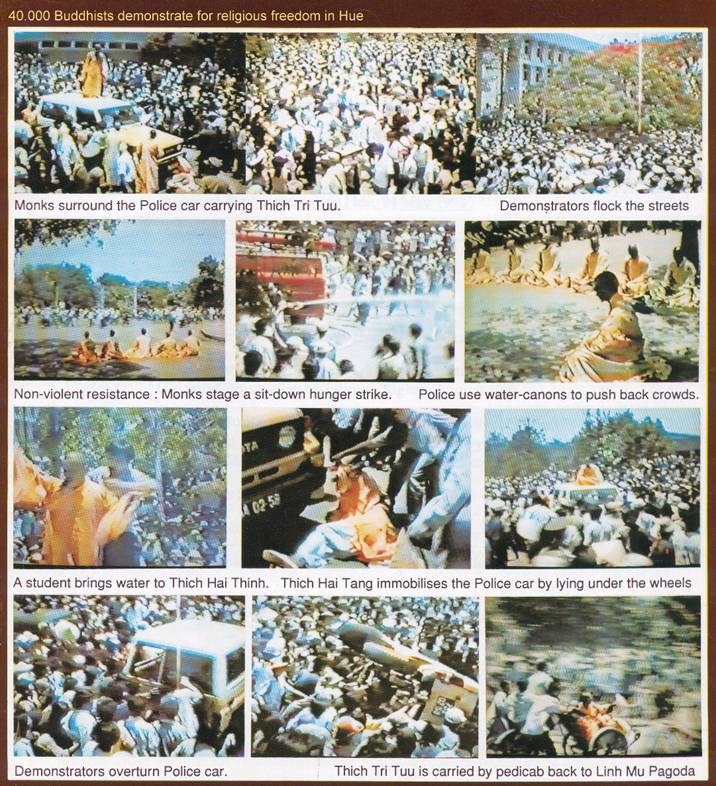PARIS, 24.5.2013 (IBIB) – Exactly 20 years ago, on 24 May 1993, a conflict between Security Police and monks of the Unified Buddhist Church of Vietnam (UBCV) sparked off a spontaneous demonstration of 40,000 Buddhists in the central city of Hue, ancient capital of Vietnam and historical centre of Buddhist dissent. This was the first mass protest in Vietnam since the country was united under communist rule in 1975. It would also be the last. Since then, Police have systematically cracked down on all peaceful protests, banning gatherings in public places and assaulting, arresting and condemning demonstrators to harsh prison sentences.
To commemorate this event, and also to remind international opinion that members of the unrecognized UBCV continue to face unabated repression, harassments and restrictions today, the International Buddhist Information Bureau presents a brief video of these historic events:
This video is a short version of 5 hours of footage made by Security forces in Hue, whose prime aim was to identify and arrest demonstrators. The Vietnamese Foreign Ministry subsequently toured the international community with this video to “prove” to the international community that the UBCV was an “extremist organization”. The International Buddhist Information Bureau and its partner the Vietnam Committee on Human Rights obtained a copy of the video, reviewed, transcribed and added comments to it to enable viewers to make their own appraisal of events.
Background: The story began on 21 May 1993, when a young Buddhist named Nguyen Ngoc Dung immolated himself before the grave of former UBCV Patriarch Thich Don Hau in the grounds of the famous Linh Mu Pagoda to protest government repression against the outlawed UBCV. Police seized the man’s body, papers and remaining belongings, and tore down an alter set up by the monks. That evening, Hue’s State-controlled radio reported the “suicide by burning of a desperate drug addict suffering from AIDS”. Venerable Thich Tri Tuu, Superior monk at Linh Mu Pagoda, wrote to the Hue People’s Committee asking permission to give the man a Buddhist burial. The authorities refused, and summoned Thich Tri Tuu for interrogations on 24 May at 7.00am. He entered the People’s Committee alone, but three monks from the Linh Mu Pagoda waited outside. The authorities tried to force Thich Tri Tuu to sign a statement confirming the government’s version of events. He refused, and went outside to begin a hunger strike. Police dragged him back inside, but the monks witnessed the scene and sent word back to Linh Mu Pagoda. Seven monks staged a sit-in hunger strike in the middle of the street. News spread quickly, and a full-scale demonstration was soon under way. Riot police with electric truncheons and water cannons were called in. By the time they finally dispersed the crowds around 2.30p.m., some 40,000 Buddhists, students and local people had joined the monks in their protest.
In the aftermath, UBCV monks Thich Tri Tuu, Thich Hai Tang, Thich Hai Chanh and Thich Hai Thinh were arrested for “incitement” and “disturbing public order”. They were sentenced to three and four years in prison at an unfair trial in Hue on 15 November 1993, along with five lay-Buddhists, who received sentences between six months and four years. They were detained in Ba Sao Prison Camp in Northern Vietnam. In prison, they staged an 8-week hunger strike to protest their sentence and demand the right to appeal. The political prisoners in section A of Ba Sao Camp joined the hunger strike in solidarity. The wardens reacted by forcibly feeding the monks and detaining them incommunicado in section B of the camp, a section reserved for dangerous common criminals. UBCV monks who travelled over 600 kilometres from Hue to visit them were refused the right to enter the camp.
Today, UBCV leader Thich Quang Do, 85, a Nobel Peace Prize nominee, is under house arrest at the Thanh Minh Zen Monastery without justification or trial. Vietnam denies that he is under detention, but diplomats such as US Ambassador David Shear and Australian Ambassador Hugh Borrowman who visited him in 2012 were able to witness his ongoing detention. UBCV mong Thich Thanh Quang, Head of the UBCV Youth Commission and Superior monk of the Giac Minh Pagoda in Danang, was brutally beaten by hired thugs as Security Police passively looked on. Buddhist Youth Movement leader Le Cong Cau was subjected to three days of intensive interrogations in March 2013 and threatened with imprisonment if he did not renounce his activities in support of the UBCV.
The International Buddhist Information Bureau calls upon the international community to strongly denounce Vietnam’s repression against the UBCV, to press for the re-establishment of the UBCV’s legitimate status and that of all unrecognized religious organizations in Vietnam.
 Quê Me Quê Me: Action for democracy in Vietnam & Vietnam Committee on Human Rights
Quê Me Quê Me: Action for democracy in Vietnam & Vietnam Committee on Human Rights





